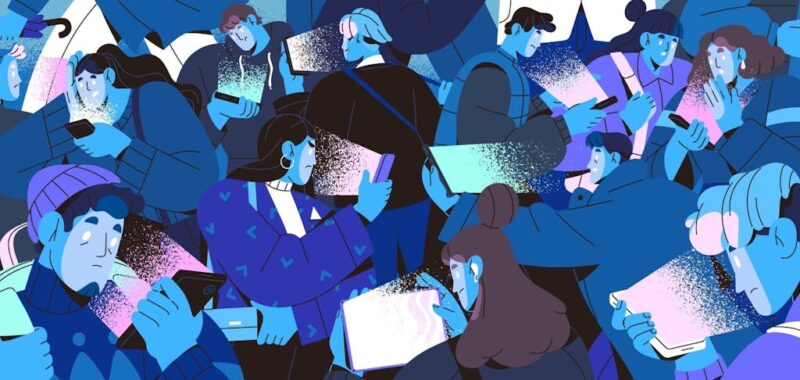Gen Z may be the first generation to have childhoods rife with screens and defined by having a second life online, but some of their cohort might also be first to say that connectivity has its downsides.
New data from the Pew Research Center shows that nearly half of Gen Z teens say social media harms people their age, and roughly the same share say they spend too much time scrolling.
Researchers didnât only take Zoomers at their word about how they think social media affects their mental health. They asked their parents, too. The study surveyed nearly 1,400 teen-parent pairs during the fall of 2024.
Hereâs how the generations overlapped and diverged on teensâ digital lives and their mental well-being.
Parents Worry More
In a perhaps unsurprising outcome, the data shows that parents are more worried about teensâ mental health than their kids are.
More than half of parents said they are “extremely or very” worried about teen mental health. Only about one-third of teens said the same.
More teens are, as the youth might say, unbothered. Twenty-three percent of teens said they were not at all worried about the state of their generationâs mental health, double the amount of unworried parents.
Parents are much more likely than their children to say tech is the biggest negative force on teen mental health, with a combined 58 percent naming social media and technology in general as their top concern.
Only 22 percent of teens said social media was the biggest problem, and their responses showed that parents underestimated the effects of bullying and social expectations.
There were also differences among who is worrying when the numbers are broken out by demographics.
Mothers and girls were more likely to be âextremely/very concernedâ about teen mental health than fathers and boys.
Black parents and teens were likewise more worried than other groups.
Couldnât Be Me
Hereâs a stat that might have parents rolling their eyes.
The survey results found an interesting contradiction: Teens overall believe that social media is harmful to their friends, according to the data, but feel they are personally immune to its ill effects.
Nearly half of teens said social media is mostly negative for their age group, but only 14 percent said it was harmful to them personally.
A plurality of Gen Z teens agreed that their social media usage keeps them from getting enough sleep (45 percent) and that it tanks their productivity (40 percent).
But only about one-fifth of young respondents said it hurts their grades, and another half of teens said social media has no effect on their performance in schools.
Some educators would likely respond to those numbers with a resounding, âSure, Jan,â given the rise in phone and smartwatch bans that school districts hope will help students focus on their classwork by eliminating the siren song of their social media notifications.
Feeling Connected, Wanting to Unplug
While adult conversations about social media tend to center on how it distracts teens from the real world, teens overwhelmingly said they see their digital world as a place where they can connect with friends and be creative.
But their experiences also vary across genders and ethnicities.
Girls reported feeling both the positive and negative effects of social media more strongly than boys. Sixty-eight percent of girls said posting on social media gave them a place to showcase their creativity, 10 percentage points more than boys. Thirty-six percent of girls felt pressure to post content âthat will get lots of comments or likes,â while 26 percent of boys said the same.
Black teens were more likely â in some cases, much more likely â to say they experienced a lot of support and creative spark from social media. The largest gap was between teens who said what they see on social media makes them feel a lot more accepted: 25 percent of Black teens compared to 10 percent of white teens.
While more than half of teens said social media makes them feel more connected to friends and like they have a support network, Pew researchers noted that those numbers have been sliding over the previous two years.
The biggest dip was the proportion of teens who said using social media made them feel supported though tough times, which fell 15 points to 52 percent compared to survey results from 2022.
Teens also made a U-turn on their attitude about how much time they spend scrolling. From 2022 to 2023, the proportion of them who said they went overboard on their social media usage fell nine points to 27 percent. That number shot up to 45 percent last year.

